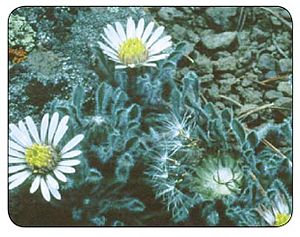Cushion Townsend daisy facts for kids
Quick facts for kids Cushion Townsend daisy |
|
|---|---|
 |
|
| var. anomala | |
| Scientific classification |
|
| Kingdom: | Plantae |
| Clade: | Tracheophytes |
| Clade: | Angiosperms |
| Clade: | Eudicots |
| Clade: | Asterids |
| Order: | Asterales |
| Family: | Asteraceae |
| Tribe: | Astereae |
| Subtribe: | Astranthiinae |
| Genus: | Townsendia |
| Species: |
T. condensata
|
| Binomial name | |
| Townsendia condensata Parry ex A.Gray
|
|
| Script error: The function "autoWithCaption" does not exist. | |
Script error: No such module "Check for conflicting parameters".
The Cushion Townsend Daisy (Townsendia condensata) is a small flowering plant. It belongs to the aster family, just like sunflowers! This plant is also called the Cushion Townsendia.
You can find this plant in North America. It grows in the mountains of the western United States and in Alberta, Canada. It loves very high mountain peaks. Here, it lives in cool, windy places like meadows, tundra, and rocky areas. It often grows near other mountain plants, like Eriogonum androsaceum.
Contents
What Does It Look Like?
The Cushion Townsend Daisy is a tiny plant. It can be a biennial, meaning it lives for two years. It can also be a perennial, living for many years. It usually grows in a small clump, only a few centimeters tall.
Its Roots and Stems
This plant has a special root system. It has a main taproot that goes deep into the ground. It also has a caudex, which is a short, thick stem base. This helps the plant survive in harsh mountain environments.
Its Leaves and Flowers
The leaves are small, about 1 to 1.5 centimeters long. They are rounded and covered in soft, woolly hairs. This fuzzy coat helps protect the plant from the cold.
The plant usually has one flower head. This head is 1 to 3 centimeters wide. It has rough, lance-shaped phyllaries around the base. These are like small leaves that protect the flower bud.
The center of the flower head has many yellow disc florets. These are the tiny, tube-shaped flowers in the middle. Around them are many ray florets. These are the "petals" that look like rays. They can be white, pinkish, or purplish. Each ray floret can be up to 16 millimeters long.
Its Seeds
After the flower blooms, it produces a fruit. This fruit is a hairy achene. An achene is a small, dry, one-seeded fruit. It has a fluffy top called a pappus. This pappus helps the seeds float away in the wind.
Special Varieties
One special type of this plant is called var. anomala. It is also known as the North Fork Easter-daisy. This variety is endemic to a specific area. It only grows in the Absaroka Mountains of Wyoming. You can mostly find it near the North Fork of the Shoshone River.
 | Selma Burke |
 | Pauline Powell Burns |
 | Frederick J. Brown |
 | Robert Blackburn |

